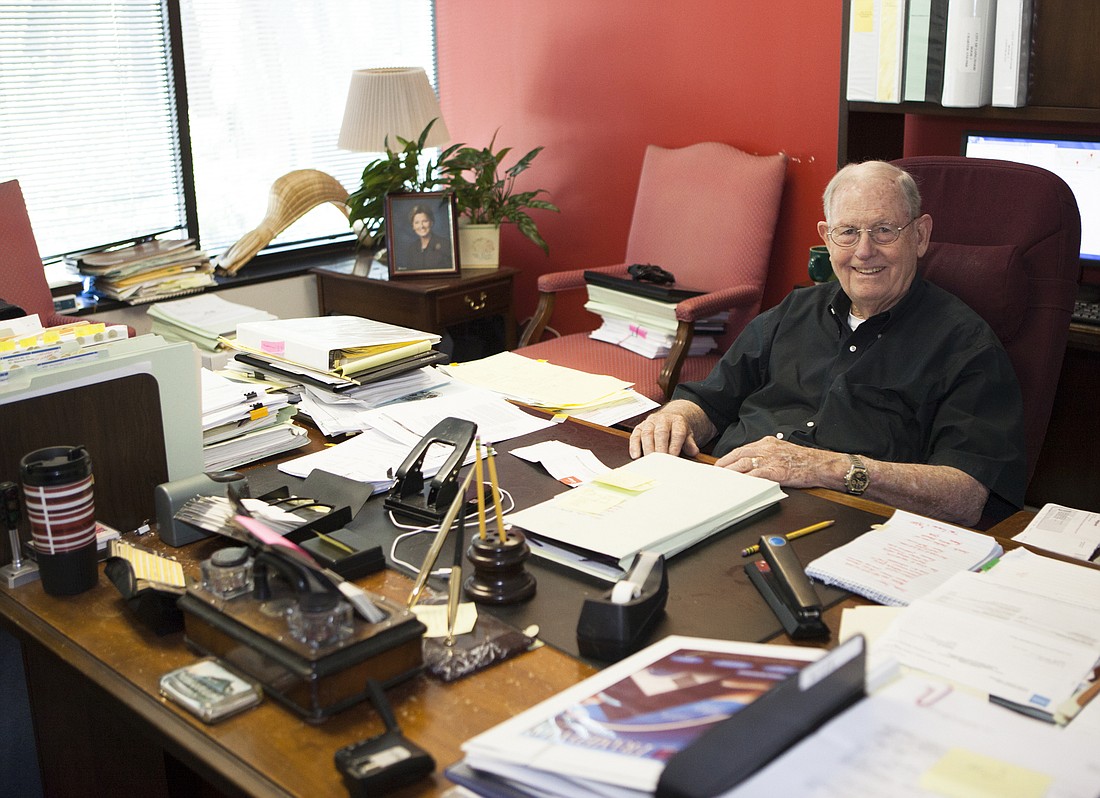- April 25, 2024
-
-
Loading

Loading

W. Reynolds Allen, a founding partner of Tampa-based Allen Norton & Blue, has represented the town of Longboat Key in union contract negotiations since 1993, when Griff Roberts was the town manager. His firm has 33 lawyers in five offices.
A self-proclaimed Florida Cracker, Allen, 73, has made Longboat Key a vacation spot for him and his family since 1983.
Allen and Town Manager Dave Bullock are preparing for another contentious negotiation session with the Longboat Key Fire Rescue Union this summer for a three-year contract in which firefighter/paramedics are hoping for wage increases and defined-benefit contribution modifications.
Q: What was it like being born and raised in Florida?
A: I grew up in downtown Wauchula, when there was a beautiful Main Street with three drug stores, two banks, a large department store and four grocery stores ... It was Mayberry. Then Wal-Mart came along like it did everywhere else, and Main Streets across America as we used to know them disappeared. That’s a shame in my book.
Q: What was your first job?
A: When I grew up, all the boys had a real job by the time they were 10. I was shining shoes on Main Street when I was 10 from 7 a.m. to 10 p.m. on Saturdays. That’s the one day all the farmers came in from the fields to do all their shopping and prepare for the coming week. When I was older, I worked at my father’s drug store on Main Street and helped him raise cattle and worked in the orange groves.
Q: What was the toughest part of growing up in Florida?
A: My dad didn’t break down and buy an air conditioner until he saw me struggling to concentrate while studying for the bar in the summer of 1964. And that was just a window unit. He was a product of the Depression, never had a loan and paid for everything in cash. I admired that.
Q: Did you always want to be a labor attorney?
A: I wanted to be a college professor, but they didn’t make any money back in the 1960s. Back then, at the University of Florida, they took warm bodies with “C” averages, so I fit the bill. Law school was $75 a semester.
Q: How long have you been practicing labor law?
A: Fifty years this year. I semi-retired 10 years ago and whittled my list of public sector clients down from 30 to my favorite 10. Longboat Key is one of my favorites because their commissioners don’t make any money and they are smart, no-nonsense former business executives who like to get right to the point, just like me.
Q: How do you celebrate after a contract is reached?
A: Sometimes we go have supper and a couple rounds of beers. And other clients, like (Longboat Key Town Manager) Dave Bullock, are pretty business-oriented, and I respect that. I think we celebrated the last fire contract in the commission meeting room with some leftover cookies and a Coke. Then, Dave had to get back to work, and I was on my way.
Q: How do you prepare in advance for negotiations?
A: I like to make sure my CEO (the town manager) is communicating with his commission. And when I’m in executive sessions with the commission, I play the role of the union lawyer. I tell them what they will face and what the union will argue. I want to know ahead of time what a commission will and won’t compromise on going into negotiations.
Q: What’s your strategy heading into a negotiation session?
A: Move rapidly, and never delay if you don’t have to. I am more likely to make counter proposals on the spot then I am two weeks later. Why waste time?
Q: When do you know when to be firm?
A: I know what my client wants going in. So if the other side of the table keeps asking for something I’ve made clear won’t be negotiated, I usually say, “We’re not going there, so what else do you want to discuss?”
Q: What’s the most important part of negotiations?
A: The most important part is the end, when deals are made. You have to know when to stop talking in circles and hand over the piece of paper that says, “Here’s where we are at.” I’m known for offering a three-year deal and then a one-year deal that’s not near as good as the three-year deal.
Q: You’re known for starting with a joke. How important is that?
A: Life is too short not to have a good time. I like to shoot the bull and I like to talk to the guys before we start. I’m friends with all the guys on the other side. Then it’s time to get down to business.